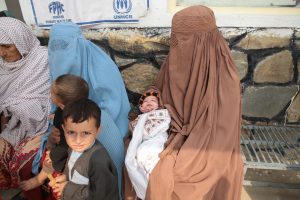UNHCR, partners supporting refugee communities to become self-reliant
News story
PESHAWAR, 09 January 2019: As part of the UNHCR global approach to boost refugee self-reliance, the refugee agency and partners in Pakistan are supporting refugee communities to stand on their own feet.
With the support of UNHCR and partners, Afghan refugee communities are operating health facilities and pharmacies in some refugee villages through their own financial sources.
Income from the refugee patients is funding the operations of the health facility at Gandaf refugee village in Swabi district, in Khyber Pakhtunkhwa. The charges are still far less than the market value, with the added benefit of the services being available at the refugees’ doorstep.

Kalsoom holds her newborn baby at Gandaf RV Health Facility (c)UNHCR/Samad Khan
“I find it convenient and affordable. I paid only Rs 2,000 (USD 15) for the delivery of my baby here, as compared to Rs 5,000 – 10,000 being charged by the facilities outside the village,” said Kalsoom, an Afghan refugee from Nangarhar province who was carrying her newborn to the facility for vaccinations and a general checkup. “And this health facility is close to my house and I don’t need to be accompanied by a male family member to come here”.
Community funds are pooled and then invested in the community labour rooms, maternity ward for short stays and community pharmacies for the continuation of some health services. In its first month of operation, the community-run pharmacy had already catered for 38 patients, while the labour room had delivered an average of 70-80 babies. Moreover, some of the most marginalized and vulnerable patients are being provided these services free of charge.
These health facilities provide not only preventive services, with the integrated management of neonatal and childhood illnesses, but also promotive services that include information-sharing to ensure the general well-being of the refugee population.
These health facilities not only cater to the needs of the refugee population but also welcome Pakistani citizens.
“The community pharmacy in the health facility is a great convenience since I do not have to go to the market to get basic medicine when the doctor prescribes them,” said Mahjabeen, a Pakistani citizen.
“We believe we are setting a great example of self-sustainability with our efforts to run this health facility through the refugee funds,” said Dr. Emel Khan, Executive Director of Frontier Primary Health Care (FPHC). ”We are able to purchase the medicine for the pharmacy at a 15 per cent discount from the market so we are able to stockpile more medicine,” he said.
UNHCR is gradually transitioning its primary health care services from the health facilities at the refugee villages to public health facilities nearby. For tertiary health services, patients are referred to tertiary hospitals.
Samad Khan in Swabi
Share on Facebook Share on Twitter